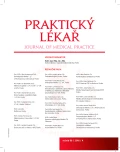The purpose of MRI as a part of pre-surgery staging for breast cancer
Authors:
K. Benediktová; P. Bystřický
Authors‘ workplace:
Chirurgické oddělení Nemocnice Písek, Primář: MUDr. Václav Čečelovský
Published in:
Prakt. Lék. 2016; 96(4): 179-184
Category:
Of different specialties
Overview
Introduction:
The inclusion of an MRI as a part of pre-surgery staging for a newly-discovered breast tumour has been the subject of discussion for some time now. The intent behind incorporating an MRI into the general diagnostic procedure is to gain additional information that could potentially lead to significantly altering the scope of a forthcoming operation. The scope of procedures in the past has been established on the basis of the conventional mammodiagnostic method.
Method:
Our patient focus group consists of 161 women. Forty-seven of these women were selected to undergo an MRI breast scan as a part of their pre-surgery staging. For those patients with a confirmed deposit of lobular carcinoma, younger patients with invasive carcinoma, and patients diagnosed with DCIS, an MRI scan was an included as a part of the diagnostic procedure. An MRI breast scan was also conducted on women for whom the conventional mammodiagnostic methods either suggested a high probability of additional ipsilateral/contralateral deposits or actually established their presence. Finally, an MRI scan was conducted on patients for whom tumour occurrence had been assumed on the basis of an imunohistochemical characterization and the extent of the initial tumour with regard to the patient’s age, as well as on those patients who suffered from a basal deposit of a cancerous lesion.
Results:
The inclusion of an MRI breast scan led to an upstaging in twelve patients, either in terms of their primary tumour or in terms of multifocality, multicentricity, or bilateral carcinoma. In eight cases this led to the proposal of a more drastic surgical procedure (mastectomy), and in four cases the scan indicated a need for a more extensive surgical resection. It must be noted that a comparison with decisive results of histopathology showed that two of the MRI scans were imprecise. The apparent inaccuracy of the MRI scan affected only one of the patients, whose surgical procedure consequently extended beyond the necessary scope.
Conclusion:
Although the focus group contains patients treated within the span of three years, it is still a rather small collection. Nevertheless, the addition of an MRI breast scan to the present pre-surgery diagnostic procedure should be regarded as very beneficial. According to the statistics available at our surgical department, the scope of surgery changed in 25% of cases where the conventional diagnosis method was supplemented with an MRI breast scan..
Keywords:
breast cancer – MRI – upstaging – surgical treatment
Sources
1. Berg WA, Gutierrez L, NessAiver MS, et al. Diagnostic accuracy of mammography, clinical examination, US, and MR imaging in preoperative assessment of breast cancer. Radiology 2004; 233(3): 830–849.
2. Brennan ME, Houssami N, Lord S, et al. MR imaging screening of the contralateral breast in patients with newly diagnosed breast cancer: systematic review and metaanalysis of incremental cancer detection and impact on surgical management. J Clin Oncol 2009; 27(33): 5640–5649.
3. Coufal O, Fait V. Chirurgická léčba karcinomu prsu. 1. vydání. Praha: Grada Publishing 2011; 50–55.
4. Houssami N, Ciatto S, Macaskill P, et al. Accuracy and surgical impact of magnetic resonance imaging in breast cancer staging: systematic review and metaanalysis in detection of multifocal and multicentric cancer. J Clin Oncol 2008; 26(19): 3248–3258.
5. Morris E, Liberman L. (eds.) Breast MRI. Diagnosis and intervention. New York: Springer 2005; 173–183.
6. Schelfout K, van Goethem M, Kersschot E, et al. Preoperative breast MRI in patients with invasive lobular breast cancer. Eur Radiol 2004; 14(7): 1209–1216.
Labels
General practitioner for children and adolescents General practitioner for adultsArticle was published in
General Practitioner

2016 Issue 4
- Advances in the Treatment of Myasthenia Gravis on the Horizon
- Hope Awakens with Early Diagnosis of Parkinson's Disease Based on Skin Odor
- Memantine in Dementia Therapy – Current Findings and Possible Future Applications
- Memantine Eases Daily Life for Patients and Caregivers
- Possibilities of Using Metamizole in the Treatment of Acute Primary Headaches
Most read in this issue
- The purpose of MRI as a part of pre-surgery staging for breast cancer
- Genotype/phenotype correlation in Czech tuberous sclerosis patients
- Preview of physical activity in selected cancer patients
- Occupational diseases reported in the Czech Republic in 2015
